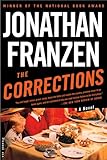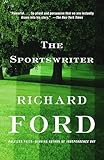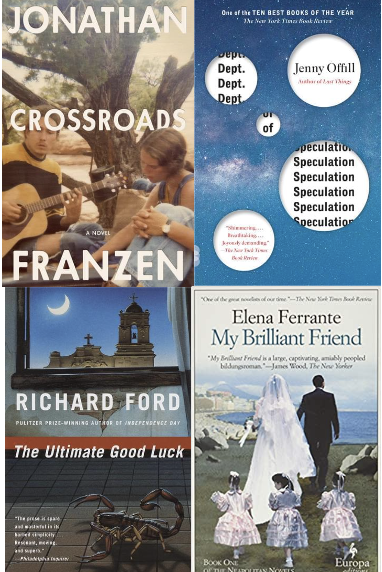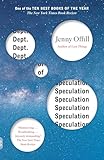1.
One of the late pandemic’s literary hullabaloos was Jonathan Franzen Day. Or more accurately, Crossroads day, in October of 2021.  In contemporary fiction, it was as close to a major holiday as we have, in the dual sense of it being a time of celebration and, after much fatigue, an event to be endured.
In contemporary fiction, it was as close to a major holiday as we have, in the dual sense of it being a time of celebration and, after much fatigue, an event to be endured.
When the day arrived, I met a friend at our local bookseller, where we spoke to the owner through a plexiglass shield. Outside it was raining, a cold, hard rain. The store had only just opened but already four copies of Crossroads—including ours—had “gone out,” the owner said, as if they’d fledged like common birds. Such is the owner’s equanimity in all things. You don’t operate a bookstore since 1975 and fall prey to the thinking that one book will pay the rent.
A survivor’s idiom, “gone out.” A language of letting go.
The bookstore is not for sale, not officially, but it’s a poorly kept secret that the owner wants to retire. If he likes you, which isn’t a given, he might ask you to work a shift. If you work a shift, the thinking goes, you might get asked to buy the bookstore.
Other than a quick driveway visit during quarantine, I hadn’t seen my friend for almost two years. The week before, we exchanged the usual hesitations and withdrawals—feel free to cancel and let’s check in beforehand—nothing certain but nothing taken for granted, so much about physical contact now provisional, elective, and necessarily so. The specter of meeting up now just that, a specter.
After the bookstore, we decided to get coffee. The coffee shop where for years we met weekly—to debate books and whether our lives were living up to them—still has regular, posted hours but whether they will open on any given day is something of a running gag since Covid. What with the weather and the pandemic-induced ebb in our friendship, I could feel the morning retreating, our Franzens in hand, our primary goal accomplished, a cup of coffee now the risk-equivalent of a hamstring pull or worse. But we arrived to find the door propped open. Even our old seats by the window were unoccupied.
Twenty years ago, I read The Corrections  with my parents, and the shared experience of Franzen’s novel is still the high-water mark of our relationship. Together we marveled at the downward spiral of the Lamberts, at Edith’s endless capacity for hope. At whether I or my younger brother, who has since died, more closely resembled Chip. My parents voted for Reagan and Bush I and Bush II but today they watch MSNBC, even while asleep, a turnabout timed to the invasion of Iraq and perhaps to The Corrections. While the slippery feeling persists of knowing them well without knowing them at all—a feeling hardly limited to parents, I admit—I can at least reach back to the time we all assembled for Jonathan Franzen.
with my parents, and the shared experience of Franzen’s novel is still the high-water mark of our relationship. Together we marveled at the downward spiral of the Lamberts, at Edith’s endless capacity for hope. At whether I or my younger brother, who has since died, more closely resembled Chip. My parents voted for Reagan and Bush I and Bush II but today they watch MSNBC, even while asleep, a turnabout timed to the invasion of Iraq and perhaps to The Corrections. While the slippery feeling persists of knowing them well without knowing them at all—a feeling hardly limited to parents, I admit—I can at least reach back to the time we all assembled for Jonathan Franzen.
Today, instead of books, my mom sends me links to CBS Sunday Morning, in which Anthony Doerr is seated by a lake.
Over coffee, my friend revealed that he and his wife have struggled through the pandemic. His marriage has reached a point of such inertia that it is almost beyond divorce, he says. They are too busy to make changes and too far apart to discuss things. I take off my mask. We still don’t have our coffee, but I need him to see my face. Mentally I add him to my list of favorite couples for whom Covid was a heavy burden, if not the end of things outright. The two divorces (and counting) were all the more troubling because they were so asymptomatic, if you will, heading into the pandemic.
The woman my wife and I see for remote couple’s therapy suggested, this past summer, that we read a book together. We hadn’t read the same book at the same time since The Goldfinch by Donna Tartt.  I was working on a memoir, so my wife reluctantly chose Mary Karr’s The Liar’s Club,
I was working on a memoir, so my wife reluctantly chose Mary Karr’s The Liar’s Club,  after reading that all modern memoirs spring from it. The language of The Liar’s Club, in scene after remarkable scene, has the universe-expanding richness of discovering gardening or encountering a new cuisine. But that book has the arc of a ruler. My wife is still on page 120, where Karr introduces the Liar’s Club members. By finishing it, and moving onto Franzen, I’ve misaligned us, and neither of us are sure about trying another book.
after reading that all modern memoirs spring from it. The language of The Liar’s Club, in scene after remarkable scene, has the universe-expanding richness of discovering gardening or encountering a new cuisine. But that book has the arc of a ruler. My wife is still on page 120, where Karr introduces the Liar’s Club members. By finishing it, and moving onto Franzen, I’ve misaligned us, and neither of us are sure about trying another book.
Nobody we know thrived during Covid, other than the shareholders of streaming platforms, but my wife and I fared better than some, and maybe most. Naturally, we’re reluctant to share our experience of a global pandemic strengthening something between us, but for all it took away, it provided some things as well.
For one thing, if you set out to write a book just before Covid, and provided you had some access to childcare if you needed it, it wasn’t sub-optimal, at least for a time, to be alone with yourself and with your partner.
At night during early quarantine, when it was time to decide what to watch or whether to read—and from here, whether to do so together—there wasn’t even the flicker of regret about our choices, because time was suddenly the commodity of which we had the most. We could re-watch The Sopranos, an investment I never thought possible, and I could finally finish Elena Ferrante’s My Brilliant Friend,  as well, with time left over for a kindhearted baking show in which baking, if you ask me, is almost entirely beside the point.
as well, with time left over for a kindhearted baking show in which baking, if you ask me, is almost entirely beside the point.
2.
The other day I ran into the woman whose husband slept with my wife eight years ago. The day after it happened, my wife told me about it, despite her knowing it might end us, given my vanity and family history. The husband waited to tell his wife, waited some more, and he never told her. It took my wife and I years to recover the trust, to get to a place where co-reading The Liar’s Club could happen, and now we’re the couple who hold hands at their son’s soccer practice. But there were days, years even, where neither of us were sure. And we’re still not sure, because you can’t be, but the will is there. The will is everything.
Books aren’t why we stayed together. No couple ever recovered from infidelity by only reading books, even the books written for that purpose. But books are what kept me from falling apart. Big books like Franzen’s Freedom, which cut a little too close to my own situation, and little books with huge undercurrents, like Jenny Offil’s Dept. of Speculation.
When I see the woman around town, I keep checking to see if the light in her eyes has gone out, like it did in mine. I still wonder if I should tell her, like I threatened her husband I would.
These are the kinds of questions that Jonathan Franzen makes me think about. Whether your person is Colson Whitehead or Jennifer Egan or Colm Toíbín, certain writers help you sort through the serious questions at a level so deep, the concept of sorting doesn’t exist there. Reading is therapy in isolation. Reading is the practice of self-awareness. The little questions, like whether to clean the house before or after a party, or whether to clean a toilet before or after using it, are up to us to figure out.
Franzen is my big book writer, big on arrival, big in theme, and for the most part, big in the literary pleasures he delivers.
Whatever you think of Franzen—moralist, systems novelist, unsympathetic nerd—the reason he matters, to me and to others, is his willingness to confront a huge slice of American reality in all its white, Midwestern, protestant former glory. While that reality isn’t our future, it is demonstrably one of our pasts, and Franzen, at a massive scale, has been fearless in showing us the terror that was always behind the lie of this seemingly uncomplicated identity. It’s the agony of maintaining a posture for so long, it threatens to break you.
Terry McDonell, a founder of Literary Hub, writes in An Accidental Life  about the “awesome post-literateness” of being asked in a bar whether his novel is fiction or nonfiction. (It’s a great moment in a book overfull with great moments; I once gave it for Christmas to everyone I knew still reading books.) While I believe that, for McDonell, there was indeed an awesomeness to confronting post-literacy, implied in his head-scratching tone is a disbelief that no longer exists. Today’s post-literateness is much grander, a thing sleeker and slicker and therefore more insidious. The last serious reader I know was seated before me, at the coffee shop, urging me to finish the Richard Ford novel I’d just told him I’d abandoned. That I’d started in part because of McDonell’s praise for Ford.
about the “awesome post-literateness” of being asked in a bar whether his novel is fiction or nonfiction. (It’s a great moment in a book overfull with great moments; I once gave it for Christmas to everyone I knew still reading books.) While I believe that, for McDonell, there was indeed an awesomeness to confronting post-literacy, implied in his head-scratching tone is a disbelief that no longer exists. Today’s post-literateness is much grander, a thing sleeker and slicker and therefore more insidious. The last serious reader I know was seated before me, at the coffee shop, urging me to finish the Richard Ford novel I’d just told him I’d abandoned. That I’d started in part because of McDonell’s praise for Ford.
It was The Sportswriter,  which despite decades of hype, didn’t disappoint in the least. But I couldn’t finish it. The novel is about distance, about the gaps in our ability to communicate and even our desire to do so. About the space required to survive repeated trauma. The loss of a child. Divorce. I just couldn’t do it, I said. Not right now.
which despite decades of hype, didn’t disappoint in the least. But I couldn’t finish it. The novel is about distance, about the gaps in our ability to communicate and even our desire to do so. About the space required to survive repeated trauma. The loss of a child. Divorce. I just couldn’t do it, I said. Not right now.
My friend convinced me I’d started out with the wrong Ford novel. He said I should read The Ultimate Good Luck,  and based on that title alone, I will. He is the last person I know who can do that for me, who can embarrass whatever algorithm Amazon uses by serving up a recommendation from inside his head.
and based on that title alone, I will. He is the last person I know who can do that for me, who can embarrass whatever algorithm Amazon uses by serving up a recommendation from inside his head.
Come to think of it, he should buy the bookstore, I said. He laughed at that.
The thin, dry miracle of his laugh. I’d almost forgotten it.










